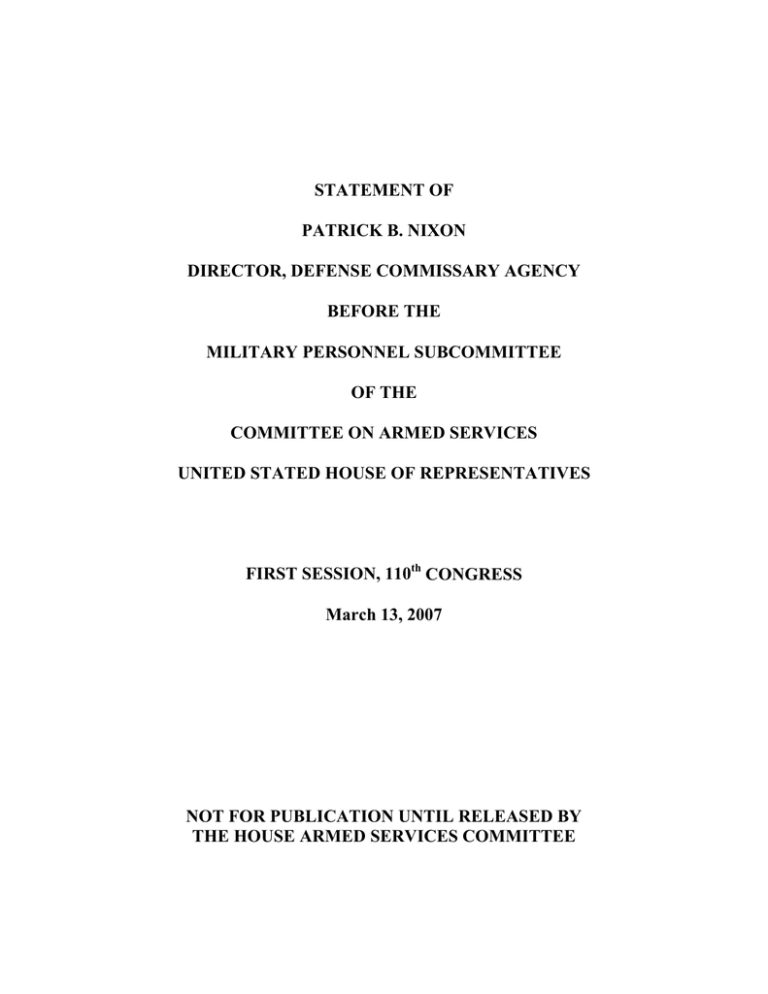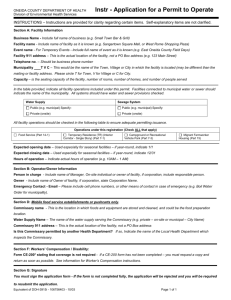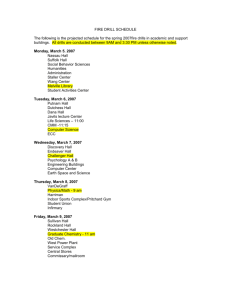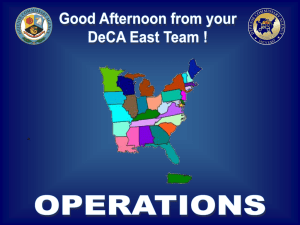STATEMENT OF PATRICK B. NIXON DIRECTOR, DEFENSE COMMISSARY AGENCY
advertisement

STATEMENT OF PATRICK B. NIXON DIRECTOR, DEFENSE COMMISSARY AGENCY BEFORE THE MILITARY PERSONNEL SUBCOMMITTEE OF THE COMMITTEE ON ARMED SERVICES UNITED STATED HOUSE OF REPRESENTATIVES FIRST SESSION, 110th CONGRESS March 13, 2007 NOT FOR PUBLICATION UNTIL RELEASED BY THE HOUSE ARMED SERVICES COMMITTEE Mr. Chairman and Members of the subcommittee, it is my pleasure to appear before you this year in my new capacity as the Defense Commissary Agency’s (DeCA) director to provide an update for the Agency’s performance this past year. Once again DeCA reached new highs in sales growth and customer service. The cost of providing the commissary benefit when measured in constant fiscal year 2000 dollars continues to decrease. We have picked up the pieces in the Gulf Coast area and the level of operations in that region is recovering. The reorganization and centralization of Agency support functions and the re-engineered processes completed this year have truly increased the value of the benefit without increasing its cost. The 18,000 employees who operate the commissary system and do such a great job running our 263 stores worldwide continue to be a source of personal pride as they rise again and again to deliver astonishing business results in the face of significant resource challenges. Combined with a dedicated management team, the administration and operation of the commissary benefit has never been stronger. Of course, for the employees at DeCA this really isn’t a job, but rather a task of love, and the personal satisfaction garnered by observing the results of our daily efforts on the faces of those who go in harms way and those of their families provides immense satisfaction that keeps the commissary at the heart of the Quality of Life benefit for the men and women who proudly serve our great Nation! After all, we serve the most deserving customers in the world and with all they’ve been through we owe it to them to provide the best possible benefit, the highest savings possible, and the overall best shopping experience we can, providing the items they want in modern accessible facilities. In short, they should enjoy a similar experience to that they would find in the retail supermarket located outside the gate. Our performance continued to excel for fiscal year 2006 ushering in another impressive year. Once again the numbers say it all — sales were up, costs were down, customer satisfaction 1 measurements increased and customer savings remained constant. While we believed our sales would level off in 2006, or even decline with the lost sales opportunities in the Gulf Coast, they actually increased, with annual sales totaling $5.42 billion. While not a primary goal, increased sales are an important measure of merit for DeCA because they are a visible demonstration of the value of the commissary benefit to our patrons. At the same time our costs again came in under program. When measured in constant Fiscal Year 2000 dollars, the administration of the commissary benefit today continues to remain below what it cost in 2000; and if we went back to the year DeCA was activated and used constant 1992 dollars, the commissary benefit delivered today costs just a little more than half of what it did then. Again, the reduction in constant dollar cost has been gained—not at the expense of our customers—but because of the efficiencies we developed and deployed throughout the Agency. This was confirmed by our overall customer service satisfaction score of 4.61, on a scale of 5—another rise this year which demonstrates the patrons believe we are obviously doing it right. Again this year our internal measures were validated externally by the American Customer Satisfaction Index (ACSI). While DeCA's FY 2006 score remained the same at 77, it continues to be higher than the commercial supermarket national average of 75. The primary change this year is that the commissary ranked second behind a single supermarket chain in customer satisfaction among the U.S. largest private sector supermarket chains. Of course, customer savings continues to be the heart of the commissary benefit. It is the level of savings that we provide to the military community and the fact that we deliver commissary items at the same price to all locations including remote locations and overseas environments that make the commissary benefit one of the highest valued benefits provided our military personnel. Based on U.S. Department of Agriculture grocery cost data and commissary 2 savings of 32 percent compared to shopping at commercial supermarkets, we estimate that a family of four that purchased all its groceries in DoD commissaries and ate all its meals at home, could save about $3,000 a year. We could not achieve this level of savings for our military families without the tremendous support our trading partners provide in pricing and promotion of their products. I would like to take this opportunity to again publicly acknowledge and thank them for their support of the commissary benefit. DeCA has also demonstrated the governance attributes of a successful governmental entity. In 2006, DeCA was evaluated using the Program Assessment Rating Tool or PART. The PART is the Office of Management and Budget’s (OMB) “… systematic method of assessing the performance of program activities across the Federal government. The PART is a diagnostic tool; the main objective of the PART review is to improve program performance. The PART assessments help link performance to budget decisions and provide a basis for making recommendations to improve results. The PART is composed of a series of questions designed to provide a consistent approach to rating programs across the Federal government, relying on objective data to assess programs across a range of issues related to performance.” Assessed factors that affect and reflect program performance include program purpose and design; performance measurement and evaluations; strategic planning and program management; and program result. OMB evaluated DeCA as “Moderately Effective”. According to the OMB ranking standards, “Moderately Effective” programs are well-managed and have set ambitious goals. Many other factors also demonstrate that DeCA possesses the governance attributes of a model governmental entity. Of significance is DeCA’s Internal Control program. As you know, the Revised OMB Circular A-123, Appendix A requires agencies to report on the effectiveness 3 of their Internal Controls over financial reporting. Effective Internal Controls over financial reporting are an important element in the submission of annual statements of assurance. Not only was DeCA’s FY 2006 Annual Statement of Assurance Scorecard rated the highest in DoD, but the Department’s Comptroller consistently holds DeCA up as the model for other DoD activities to emulate in implementing their Internal Control programs. Because we review all our major processes, our strong Internal Control effort contributed significantly to DeCA receiving its fifth consecutive clean audit opinion on its financial records. That audit reviews all of our money accounts—sales, surcharge, capital investment and the annually appropriated operating funds; and daily activities such as how accurately we record time and attendance and maintain physical inventory and accountability of assets at our activities worldwide. On the BRAC front, after the dust has settled only six installations with a commissary store are scheduled to close. On the other hand the Overseas Integrated Global Presence Basing Strategy is expected to impact 28 commissaries. Of more concern than the scheduled closures are those sixteen installations where DeCA operates commissaries both overseas (six) and in the United States (ten), that are projected to gain significant personnel as restationing progresses. We will need to program for new construction or expansion of existing facilities to accommodate the increased personnel at the gaining installations. This situation has required that we reprioritize our construction programs and reevaluate our store replacement model to accommodate these additional requirements. Of course, BRAC and overseas restationing are not the only demands on the surcharge program. The worldwide increase in construction costs, and the tremendous information technology investments required to replace cash registers, have created significant challenges. Needless to say, however, without your foresight in passing the Surcharge Revitalization Plan in 4 2000, we would be in much worse shape today and would only have had enough surcharge to perform required repair and maintenance on our stores. Our BRAC related reorganization plans are well under way. We have completed realigning many of the functions performed in the regions, centralizing their control and performance under the appropriate headquarters staff element. We have closed the former region offices in Virginia Beach and San Antonio. Those closures were required as a result of BRAC 2005, and the region functions previously performed in those locations have been co-located with our Headquarters at Fort Lee. The addition to the Headquarters building required to accommodate the remaining off installation functions currently performed in leased space in Hopewell, Virginia, has been funded by BRAC and its design is under way. We expect construction to start later this year. We do not anticipate transferring our Human Resources Operations Division, currently located in Arlington, to the Defense Logistics Agency until the 2008-2009 timeframe when DeCA converts to the National Security Personnel System. The combined personnel functions will be performed in Columbus, Ohio. As I mentioned last year we have been focusing our reengineering efforts to optimize our business processes using Lean Six Sigma. We have completed 17 Lean Six Sigma projects that have increased operational efficiency while reducing cost. Two examples of our more successful projects are the consolidation of our Information Technology Help Desks and the reengineering of our equipment inventory management procedures. Both projects resulted not only in a reduction in cost, but also an increased efficiency. A number of the programs, some of which I mentioned last year, continue to provide value to our patrons. 5 Of course, first and foremost on everyone’s mind today is food safety. The E. coli outbreaks and spinach scares of last year have made food safety the “industry’s top priority”. To provide an additional level of food security which I believe commissary patrons deserve, late last year I directed that DeCA would observe the source inspection requirements of the United States Army’s Veterinary Command for the acquisition of food and water. We will only use suppliers for commissary products that undergo a source inspection from those listed in the Worldwide Directory or from those sources inspected by other federal entities recognized by the DoD Approved Sources Division. Current and potential suppliers of commissary products requiring a source inspection have been made aware of this guidance to ensure they understand and obtain the appropriate inspections before they begin, or within a reasonable time of beginning, to supply DeCA; when changing manufacturing or processing plant locations; when selecting subcontractors; or when expanding their contract to introduce additional products into the commissary system that require source inspection. We are working closely with the Army’s Veterinary Command and the United States Air Force Public Health Service to ensure military families receive this extra layer of food security for those products that have the most risk of harm to their health. The DeCA/TRICARE partnership for the “It’s Your Choice, Make It Healthy” program, highlighting healthy foods available in military commissaries, has been extremely successful in informing military families about eating healthier and promoting concepts such as weight management and fitness, not only physical but also financial, as they save by shopping their commissary. While many of our larger commissaries have already been configured with “Wellness Centers” to highlight products for health conscious patrons, we will soon deploy the showplace “Wellness Center” in our flagship store at San Diego, scheduled to open next month. 6 Combined with an increased selection of natural and organic foods, and the addition of a dietitian to the DeCA staff, the “It’s Your Choice, Make It Healthy” message is reaching military families around the world. Having a registered dietitian on staff increases DeCA’s ability to educate customers on how to make healthier meal choices at the commissary – reading product labels, enjoying more fresh fruit and vegetables and leaner meats, and preparing meals at home instead of hitting the fast food drive thru or spending hard-earned money at restaurants. Some of the initiatives planned for the DeCA dietitian include an “Ask the Dietitian” feature on the DeCA Web site and increased visibility for the recently revamped “5 A Day for Better Health” program, which focuses on fruits and vegetables. We were also pleased to honor the request of an independent commercial grocer near Boston to utilize our “It’s Your Choice, Make It Healthy” materials so they could provide their “…retired military customers and associates, who find it difficult at times to get to the closest commissary …[this] essential nutritional information for healthy food choices.” In keeping with its nutritional leader goals, DeCA commissaries joined this year’s Family Day – A Day to Eat Dinner with Your Children. A national event, established by Presidential Proclamation, the program is intended to remind Americans of the importance of staying involved in their children’s lives. Over 10,000 military families signed the Family Day pledge by accessing the National Center on Addiction and Substance Abuse web site at Columbia University, through a link from DeCA’s web page. To draw even greater attention to Family Day, the military sales team of the Coca-Cola Company sponsored a three-day, two-night trip to New York for one military family. The winner will also get a family dinner cooked by Sandra Lee, best-selling author and host of the Food Network show “Semi-Homemade with Sandra Lee.” Partnering with DoD schools, TRICARE and family organizations such as the National 7 Military Family Association, Family Day was a ready fit with DeCA’s “It’s Your Choice, Make it Healthy” initiative encouraging military families to think of the commissary as the place for healthy food, healthy savings, and healthy family. Our Internet venture—the Virtual Commissary, which currently features gift packs of items, at commissary negotiated prices, will soon be expanded and a variety of individual commissary items will become available to commissary patrons whose eligibility is verified through the Defense Enrollment Eligibility Reporting System (DEERS) database. We anticipate having a contractor who will pick, pack and ship individual products ordered by authorized patrons from a selection of commissary items, again at commissary prices plus a fee for shipping, handling and delivery to their location, on board this summer. We are excited about this initiative which, while available to all authorized patrons, is primarily designed to take the commissary to those Guard, Reserve and retiree families who do not live near a commissary and to those deployed to forward areas. The change instituted last year in our produce procurement methodology that adopts the best practices of the supermarket industry, has shown results beyond anyone’s imagination. Wherever the change has taken place, tonnage sold is up, patron savings have increased, and customer satisfaction is simply phenomenal. Shoppers are buying more produce, because they get higher quality at lower prices than before. In fact, for the second year we have continued to see double digit increases in produce sales. But beyond just increases in produce sales, we have seen patrons return to the commissary more often to do their fill in shopping as a direct result of this newly implemented program. It is this type of initiative that enables us to increase the value of the commissary benefit without increasing its cost. And behind the scenes, ordering and receiving is more efficient. As a result, the stores’ produce personnel have more time to spend 8 setting and maintaining the displays and generally being out on the sales floor serving our patrons. It is a tremendously successful program. Thank you for your insight in supporting the adoption of commercial produce industry practices. While we had hoped to have our produce program fully implemented, as you know the government contracting process allows multiple opportunities for bid protests, and that process has to run its course. While we used produce industry inputs to develop our program; maintained it as a 100% set-aside for small business participation; and competitively awarded the contracts, we received several bid protests that slowed the process slightly. At this time most of the legal issues for the contracts have been resolved, with the Government Accountability Office sustaining our actions in every instance on the protests they have decided. We anticipate the two remaining challenges will be favorably resolved shortly and that soon all of our patrons will be able to enjoy the savings and quality provided by this program throughout the commissary system. Of course, other programs available through the commissary have helped military families as well. Since the Gift of Groceries program began in the fall of 2002, over $11 million in commissary gift certificates have been provided to military families. Since its inception in 2001, the Scholarships for Military Children Program has provided more than $5 million to nearly 3,000 students, and we expect another 500 students will each receive a $1,500 scholarship this spring. Contributions by industry companies that support the commissary system, as well as from members of the general public, totally fund this program. They deserve our heartfelt thanks for their assistance in making life just a little bit easier for military families. Other advancements are making the commissary more effective, efficient and customer friendly. Our new front end system, the Commissary Advanced Resale Transaction System 9 (CARTS), is being deployed now. CARTS features new cashier stations designed to dramatically improve how stores process customer transactions. This new generation of frontend technology provides a simple to use, accurate and secure scanning system for purchases. In addition to the “full lane” that allows customers to process large orders, it includes several types of self-checkout modules. Whether one is looking for the “express” feature when purchasing fewer than 15 items; or a moderate order of 30 items, there is a self-checkout option that lets the customer do it his way. Other features that improve the shopping experience include a 15-inch color screen display so customers can better view their purchases, hand-held scanners for cashiers to reach bulkier items in the cart, and self-help price check stations located for customers around the store. Our Workforce of the Future is developing a store workforce that is simple in design, easy to manage, cost effective and more productive while maximizing the changes anticipated by implementation of the National Security Personnel System. It is being deployed to 51 stores this year, and we plan to complete deployment to the remaining stores within the United States by December 31, 2008. As you may recall our workforce model, based upon that used in the commercial grocery industry, eliminates12 different position descriptions, replacing them with two — a multi-skilled Store Associate and a General Manager. When deployed, this model will position the government workforce to be more competitive in future A-76 studies. Beyond the commissary benefit I believe that working together with my Exchange brethren, we can strengthen the entire military resale system without adversely impacting any of the individual components. Starting with the merchandising test you chartered, the Exchange Commanders and I have opened discussions in a number of areas. I believe there are a number of opportunities which will provide a win for the exchanges, a win for the commissary, but above 10 all a win for the military resale patron. Some examples of areas we are exploring are sale of exchange merchandise in commissaries and a shared facility concept. Providing an additional outlet for exchange merchandise and sharing the revenue as you authorized last year will capitalize on incremental sales which can increase contributions to MWR dividends and generate surcharge funding. Likewise, reducing the burden on commissaries and exchanges by sharing the support cost, such as personnel, front-end, and IT, by operating a commissary and an exchange under the same roof would intuitively seem to be an ideal cost reduction mechanism. These concepts are in their infancy and have much work to be done. Next month when customers enter the new Naval Base San Diego Commissary, they will be walking into the largest, most modern military commissary in the world. The 118,000-squarefoot store, scheduled to open April 20, will serve the area's 122,000 service members and their families. We call it the “store of the future” because it will have some concepts in it that we will unveil for the first time. One of them is the "store within a store" concept. A "store within a store" gives customers a choice of two primary entrances, one for the shopper who wants to pick up a few key items in as little time as possible, and one for the "pantry loader." At either entrance, customers can place deli and bakery orders at a touch-screen kiosk. The order is processed while the customer shops and can be picked up just before heading to one of 18 fullservice registers or 11 self-checkouts. The store also contains a large health and wellness center that emphasizes our nutritional awareness theme. The store's health and wellness center will feature an array of organic food products. The store will also include ethnic products in the bakery, a gourmet olive bar and multiple information kiosks with interactive touch screens and print capability. The kiosks will be strategically placed like beacons throughout the store. Last, 11 but certainly not least, there will be a "cooking school" near the health and wellness center that will be the store hub for healthy cooking demonstrations. Of course, our primary focus always remains on the patron and we continue to use every available avenue to reach out and inform them of the value of their commissary benefit. This continues to be a joint effort with industry member participation in providing promotional programs, such as the special high value coupon booklets made available to Guard and Reserve families that are some distance from a commissary, and the generous support of NEXCOM and AAFES in including commissary messages in their mailings to their customers. We continue to provide the value of the commissary benefit message at the Service’s basic training installations. Commissaries actively participate in all pre-deployment briefs and at family support briefings aimed at Guard and Reserve families. We are continuing to partner with manufacturers and distributors to offer truckload sales of authorized commissary products at Guard and Reserve Centers, like the Hill Air Force Base commissary’s helping the Utah Air National Guard in Salt Lake City celebrate its 60th anniversary. Initially this sale was going to involve just a few pallets of paper products and picnic supplies, but as other suppliers learned of the event, they wanted to support the troops and their families, too. Others have smaller programs, such as the Fort Huachuca Commissary: For two months this last summer, every Thursday afternoon at 4 p.m., they set up a roadside stand with snack and other items in the parking lot at the San Jose Lodge for Marine Reservists helping agents at the U.S. Border Patrol’s Naco Station construct roads and fences. These Reservists had no direct access to the post, so we provided them an opportunity to purchase goods at commissary prices. But perhaps the most effective outreach we have comes from the one-on-one interaction between our employees and our customers. I get many comments from those with health 12 problems who appreciate the assistance our employees give them with their shopping, or the support provided military units in ensuring they have adequate supplies for various organizational activities. But, I would like to share just two of the many comments I receive from those customers who tell me about their experience while shopping in the commissary that they believe go above and beyond the call of duty. From Adrian Cook, military spouse, Tyndall Air Force Base, Florida: “[M]y groceries were checked out by Wannetta Hayes. Upon completion of the transaction, my bank card would not go through because the bank network was down. By then I was an outraged person. The bank representative did not know when service would resume. I explained this to Wannetta and told her I would be back before I went to work. Wannetta offered to pay for my groceries. That is the nicest thing anyone has ever done for me. She knew I was upset and embarrassed, and she made all of that go away. Wannetta paid for a complete stranger’s groceries without hesitation. She is one in a million.” From Nora Beck, military spouse, Royal Air Force Croughton, England: “I feel compelled to write and inform you of the outstanding customer care received from Michael Suppa. My husband went shopping for some banana bread mix. He returned home without it. I assumed he forgot. When I left the house the next day, the bread mix was on my doorstep. I assumed my husband dropped the two packets. When I next went to the commissary, Michael asked me if I had received the bread mix. It turned out my husband had asked Michael for the bread mix, and they could not find any. After my husband left the commissary, Michael found the bread mix had been moved to a display by the bananas. He proceeded to purchase two packets and placed them outside my house. I live about 11 miles from the base. After speaking 13 to Michael, I offered money for the mix, and he refused, saying he should have been able to find the mix and not send my husband away empty-handed.” These stories sum up DeCA’s commitment to the Service members and their families and demonstrates how engrained the commissary benefit has become in their daily lives. When all is said and done, it all comes down to people taking care of people – and no one does that better than those who serve the Military Services! We, at DeCA, are proud of the contribution we make in operating the 263 commissaries worldwide that provide tremendous savings on groceries for military personnel, retirees and their families. We recognize that commissaries deliver a highly valued component of military compensation in areas where the cost of living is high, and they bring a morale-building “taste of home” feeling by providing familiar American food products in overseas locations where such products are often unavailable. A core military family support element, and a valued element of military pay and benefits, commissaries contribute to total family readiness and enhance the quality of life for America’s military and their families. But, we don’t do it alone, many others help us, and to recognize that this year we developed the “Champion of the Benefit” Award. I am extremely please that its first recipient is a member of this subcommittee. While this Subcommittee has championed the commissary benefit, Representative Thelma Drake has not only been a strong advocate for our military personnel and their families, but has also made it a priority to strengthen the commissary benefit and was an especially strong supporter. She recognized the value of the produce test, advocating its earliest adoption and understood the business case for consolidating support functions at the headquarters. Thank you again Mrs. Drake for your support and my thanks to all of you on this subcommittee for the continued emphasis you place on the value of the commissary benefit. 14 Once again it has been my pleasure to have the opportunity to tell you about the great things DeCA has accomplished this past year and of its contribution to the quality of life of our military families. I will be happy to answer any questions you may have. 15





